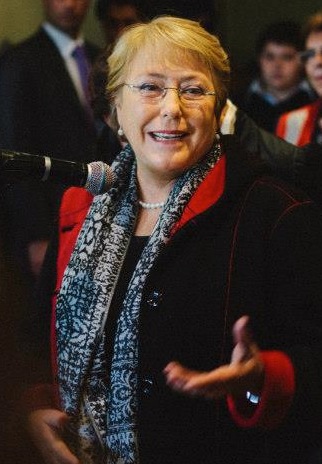Michelle Bachelet returned to Chile on Wednesday, wasting no time in declaring her much-awaited candidacy for president, with an air of inevitability that makes former U.S. secretary of state Hillary Clinton’s hold on the U.S. presidency in 2016 seem tenuous.![]()
Bachelet (pictured above), who previously served as president from 2006 to 2010, and more recently as the United Nations Entity for Gender Equality and the Empowerment of Women, would be the first Chilean president in the post-Pinochet era to win a second term to the presidency.
Under the Chilean constitution, no president may run for reelection, though presidents can return for non-consecutive terms.
She is almost certainly a shoo-in to win the presidential nomination of the Concertación de Partidos por la Democracia (Concert of Parties for Democracy), usually known simply as the Concertación, the coalition of center-left parties that has dominated Chilean politics in the era following the military dictatorship of Augusto Pinochet.
Bachelet is also the favorite to win the general election on November 17 — although incumbent Sebastián Piñera will not be on the ballot, he’s had a turbulent time as president since his election in 2010. Piñera’s greatest contribution to Chilean democracy may well have been his election — after running a moderate, respectful campaign, his election marked the return of conservatives to power for the first time since Pinochet left office, trumpeting the full normalization of Chilean politics.
But Piñera will leave office relatively unpopular — despite his government’s successful rescue of 33 trapped miners in October 2010, more recent troubles, such as rising poverty, income inequality and massive student protests in 2011 and 2012 in favor of the creation of new public universities, the end of for-profit education, and a new system to facilitate the financing of secondary education, have left his administration unloved and mocked for its numerous hiccups and misfortunes — so-called piñericosas.
The two likely candidates to challenge Bachelet will face off in a June primary among the parties of the Coalición por el Cambio (Coalition for Change), which formed in 2009 to boost Piñera’s campaign as a merger of two parties (and some other smaller parties):
- The Unión Democrata Independiente (UDI, Independent Democratic Union), a party formed in the early 1980s among civilian supporters of Pinochet’s economic policies and military rule, and which moderated itself in the early 2000s.
- Renovación Nacional (RN, National Renewal), which broke away from the UDI over the issue of the 1988 plebiscite on Pinochet’s continued rule — although RN ultimately largely supported Pinochet’s reelection, it originally favored an alternative candidate. Piñera himself comes from the RN leadership, not from the UDI.
The UDI’s has indicated that its candidate will be independent Laurence Golborne, an engineer by training and the former CEO of Cencosud, a Chilean retailer. He was, until recently, the Chilean minister of public works and before that, the former minister of mining and energy, where he became very popular in the wake of the government’s successful 2010 Copiapó mine rescue. The RN candidate, Andrés Allamand, until recently, was Chile’s defense minister.
A CEP Chile poll in early January showed 49% favored Bachelet, while 11% supported Golborne and just 5% backed Allamand. Another late January poll showed Bachelet leading 42% to 15% for Golborne and 5% for Allamand.
That lead will invariably narrow between now and November, however, when the center-right candidate emerges in June. Despite the highest income inequality in the Organization for Economic Development (note that Chile is the only South American OECD country), Chile’s strong mining industry has powered growth rates of 6% since 2011, its GDP actually growing faster than before a temporary dip during the 2008-09 global financial crisis.
It’s quite incredible to think that the Concertación, which controlled the Chilean presidency from 1990 to 2010, held consecutive power three years longer than the military mostly under Pinochet (17 years). The Concertación includes four parties:
- The Partido Demócrata Cristiano (PDC, Christian Democratic Party), the most centrist of the parties, existed prior to the Pinochet era and which held power under Eduardo Frei Montalva in the 1960s. It took a large role in organizing the transition from dictatorship to democracy in Chile, and it gave Chile its first two post-Pinochet presidents, Patricio Aylwin, from 1990 to 1994, and Eduardo Frei Ruiz-Tagle (son of the former president) from 1994 to 2000.
- The Partido por la Democracia (PPD, Party for Democracy), a more social democratic party, was formed in December 1987 at the end of the Pinochet era by Ricardo Lagos, who was Chile’s president from 2000 to 2006.
- The Partido Socialista de Chile (PS, Socialist Party of Chile) was the party of Salvador Allende, president from 1970 until his overthrow (and death) on September 11, 1973. Bachelet, whose father was an Allende advisor, hails from the PS — the first PS president since Allende.
- The Partido Radical Socialdemócrata (PRSD, the Social Democratic Radical Party), the smallest and most leftist of the parties.
Bachelet will face only token opposition in the Concertación primary, and her reelection bid has breathed new life into a coalition that, without Bachelet, would have faced a listless and divided future.

4 thoughts on “Bachelet enters Chilean presidential race as top contender”